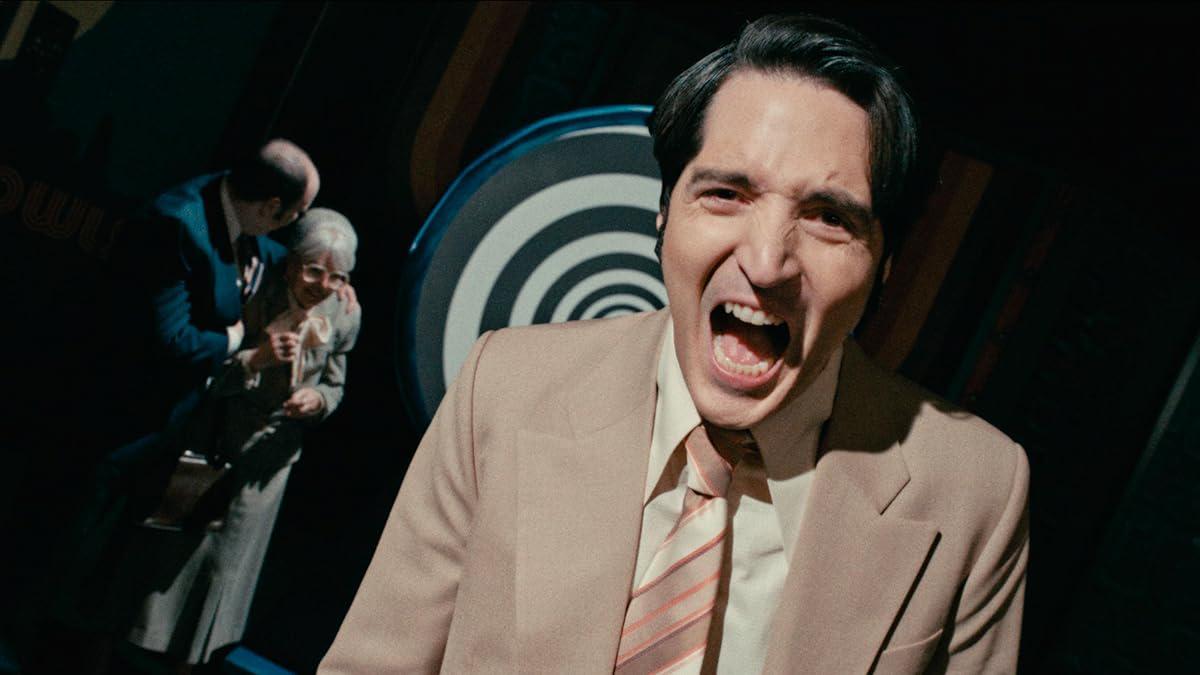Over a year since its first premiere, Late Night with the Devil has finally emerged as a biting satire and a cautionary tale wrapped in the trappings of a Halloween horror special. Directed by Australian duo Colin and Cameron Cairnes, the film presents a deviously sinister narrative set against the backdrop of a 1970s talk show, delivering both nostalgia for the era and a fresh take on the plagues of mainstream media.
David Dastmalchian shines as the hapless Delroy, channeling equal parts charm and desperation. Once a rising star in the late-night circuit, the talk show host finds himself grappling with declining ratings and personal tragedy. Beneath Delroy’s slick smile lies a darkness that threatens to consume him whole. As the night unfolds and the studio descends into chaos, Delroy’s Faustian bargain becomes increasingly clear, serving as a prophetic admonition for the pitfalls of ambition in the cutthroat world of showbiz.
Late Night with the Devil (English)
Director: Colin and Cameron Cairnes
Cast: David Dastmalchian, Laura Gordon, Ian Bliss, Fayssal Bazzi, Ingrid Torelli, Rhys Auteri, Georgina Haig, and Josh Quong Tart
Run-time: 93 minutes
Storyline: In 1977, a live television broadcast goes horribly wrong, unleashing evil into the nation’s living rooms
The Cairnes brothers’ meticulous attention to detail is evident in every frame, as they skillfully recreate the aesthetic of a ‘70s studio. From the vintage celluloid wash of period-appropriate equipment to the pitch-perfect performances that straddle the line between camp and sincerity, the film transports us back in time, immersing us in the bygone era of live TV.
The Australian filmmakers demonstrate a keen eye for parody, infusing every dialogue with sly wit and biting humor that all hint at a brewing tragedy about to unfold. The writing revels in its own absurdity while never losing sight of its thematic underpinnings. Through Delroy’s increasingly desperate attempts to salvage his show à la Network’s Howard Beale, the film skewers the shallowness of celebrity culture and the relentless pursuit of ratings at any cost. It’s a deliciously wicked send-up of an industry built on smoke and mirrors, where reasoning is often sacrificed on the altar of entertainment.

David Dastamalchian as Jack Delroy in a still from ‘Late Night with the Devil’
Delroy’s interactions with the eclectic cast of characters — including the creepy Lilly (played with frightening eccentricity by Ingrid Torelli), the charming psychic Christou (a scene-stealing turn by Fayssal Bazi), and a curmudgeonly skeptic Carmichael (played by Ian Bliss) whose sole purpose seems to remind us as the audience of how stupid we are from the get-go — is disconcerting to watch, each interaction provoking an uncomfortable wriggle in our seats in anticipation for the climactic tipping-point.

Without a doubt, the pièce de résistance of the film, much to the glee of horror aficionados, is its delightful medley of homage to genre classics. From John Carpenter’s gleefully grotesque embrace of practical body-horror to loving tributes honoring Linda Blair’s iconic, hair-raising transformation, the Cairnes’ love affair with the genre dances across the screen with a flair that’s uniquely their own.
While Late Night with the Devil is undeniably a horror film, it transcends genre conventions with the Cairnes brothers expertly balancing moments of tension and humour, keeping us hooked from start to finish. With its tongue planted firmly in cheek, the film delivers (nervous) laughs aplenty amidst the screams, serving as a wickedly entertaining romp through the darker corners of the entertainment industry. Though the film may lack some genuine surprises, its real strength lies in its sardonic observations on the industry and some chilling, atmospheric storytelling.

Late Night with the Devil is a devilishly clever satire that serves to expose the dangers of unchecked ambition and the seduction of sensationalism in the media. It’s a reminder that lurking within the neon glows of our living rooms (or perhaps just among the Jimmy’s) are the most malevolent monsters we willingly welcome.
Late Night with the Devil is currently running in theatres.































